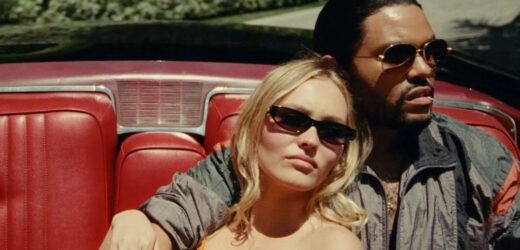What The Weeknd wants, The Weeknd gets in “The Idol,” a skintastic, dark-side-of-showbiz fable that perpetuates the myth that pop stars are corporate puppets with no say in their own image-making, even as it allows hit-maker The Weeknd to call the shots (and reshoots, apparently, since the five-part HBO series was overhauled late in production to suit him).
Picture “Blonde” as Joe Eszterhas might have written it, but with better music.
After making a toe-dip cameo as himself in A24’s “Uncut Gems,” the R&B phenom-turned-TV producer plunges head-first into acting here, teaming with “Euphoria” creator Sam Levinson to imagine a shady super-predator just looking to corrupt an unsuspecting young pop singer. The edgy, high-gloss HBO series, which premiered the first two of its five episodes at the Cannes Film Festival, demands a lot of star Lily-Rose Depp. She plays “rags-to-riches, trailers-to-mansions” Jocelyn, a mono-monikered Britney or Miley type who seems empowered one moment, impressionable the next.
Embracing scandal from the outset, “The Idol” opens with Jocelyn mid-photo shoot, trying to wriggle out of the nudity rider in her contract. “It’s my body!” she insists, convinced she should show more than just “side boob” on her next album cover. (Clearly, no such protections exist for Depp, whose costumes consist mostly of straps and strings and not much else.) A modern-day princess of sorts, Jocelyn is attended by an entourage of yes-people — from co-managers Chaim (Hank Azaria) and Destiny (Da’Vine Joy Randolph) to her spin-doctor/publicist (Dan Levy) and lifelong bestie Xander (Troye Sivan) — who are collectively more concerned with telling her what she wants to hear than giving her the honest truth.
To that end, no one wants to inform Jocelyn of the latest crisis: Someone has leaked a compromising photo of the singer, and no-nonsense label exec Nikki Katz (Jane Adams, hilariously inappropriate) and the Live Nation rep responsible for her upcoming tour (Eli Roth) are both losing their minds. “How are 14-year-old girls going to buy tickets to the concert when she’s frosted like a Pop Tart?” Chaim asks in one of the smarmy show’s campier lines.
For all of 23 minutes — most of them eye-witnessed by a Vanity Fair writer (Hari Nef) — “The Idol” feels like it might be offering real insights into how the music industry does damage control, the way “In the Loop” and “Veep” showed their characters constantly putting out political fires. Then the photo scandal blows over, forgotten almost as quickly as it flared up. Jocelyn heads out to a club on the Sunset Strip, wearing an ultra-short, ultra-sheer party dress that gets her instantly noticed by Tedros (The Weeknd), a mysterious music-industry fringe player — a manager who crosses the lines with his clients, treating them the way a pimp does his stable — who’s been waiting for her to venture into his web.
Compare their first encounter to the masterfully crafted meet-cute in Bradley Cooper’s “A Star Is Born,” and it’s “The Idol” that comes off looking shallow: Levinson gives us virtually no indication of why Jocelyn and Tedros’ characters might click before sending them sneaking off into a stairwell to hook up. Interrupted by the singer’s best friend/assistant Leia (Rachel Sennott), Jocelyn heads home and proceeds to masturbate ferociously, choking herself till she climaxes.
One could argue there’s something revolutionary in the way Levinson depicts female sexuality — although the cast of “Showgirls” would probably beg to differ. Whereas that project all but ended Elizabeth Berkley’s career, “The Idol” positions Depp as a fearless performer. Her barely-there wardrobe and hyper-erotic choreography push back on the kind of celebrity sex shaming blasted by docs such as “Framing Britney Spears” and “Janet Jackson.” But Levinson takes things too far in the other direction, getting kinky anytime Jocelyn and Tedros are together.
The script (overhauled by Levinson, Reza Fahim and The Weeknd after an earlier, Amy Seimetz-helmed version was scrapped) seems calculated to fool audiences into thinking they’re observing how Hollywood operates, when so much of it amounts to tawdry clichés lifted from Sidney Sheldon novels and softcore porn. “Showgirls” at least was a thinly veiled “All About Eve” remake, whereas “The Idol” plays like a sordid male fantasy.
Levinson never convincingly establishes why Jocelyn deserves to be labeled an “idol” (one of those overused hype words that’s all but lost its meaning) or what kind of role model she represents to her fans. We’re told she’s recovering from a psychotic break, which forced her to cancel a previous tour. The show catches up with her midway through a big makeover, which Jocelyn decides isn’t nearly as passionate as she feels inside. With Tedros’ help, she remixes her “World Class Sinner” single to feature hot-and-heavy panting, which the label hastily rejects.
But Tedros’ scheme is just getting started: Seducing Jocelyn came way too easy, and the more he emerges as an influence on Jocelyn in the episodes ahead, the less room there is for “The Idol” to pretend that it’s celebrating this imperiled singer’s autonomy — as an artist or as a woman. “Pop music’s like the ultimate Trojan horse,” Tedros tells her, and the same could be said for zeitgeist-shaking TV series: They can be a delivery device for subversive social critique. Trouble is, Levinson’s worldview seems corrupt. It shouldn’t take degradation and suffering to make Jocelyn stronger. “Euphoria” audiences won’t be too surprised by the shameful way he treats Depp’s character, as both she and the show appear trapped under The Weeknd’s thumb.
“The Idol” will premiere on HBO on June 4.
Read More About:
Source: Read Full Article


